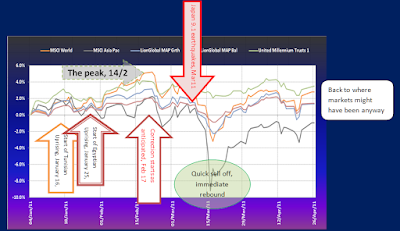2015 - Second Half Outlook - EUROPE - Part One - GREECE
Europe is not just a union of states. Within it, there is the EU Zone, consisting of those countries who use the common currency, the EUR. Then there is the second tier, countries that aspire to join the EU Zone and enjoy its benefits. But there is third group, which so far consider it more advantageous to stay away from the EU Zone.
Often commentators do not distinguish when they comment on "Europe". While the main comments in this report focus on the EU Zone, I want to comment on other European countries, too.
Often commentators do not distinguish when they comment on "Europe". While the main comments in this report focus on the EU Zone, I want to comment on other European countries, too.
PART ONE - GREECE
The Hottest Topic
Despite its "minimal" economic relevance, Greece is today's hottest topic. Historically, she is the cradle of European culture, philosophy, the birthplace of democracy, and medical knowledge. But today's Europeans often describe Greeks as lazy, disorganised, living a dolce vitae without a care for the world. I don't know many Greeks and I loathe judgemental stereotypes, so I can't really argue a case. But somehow, I sense that the same people object to the "easy life" of the Portuguese, Spaniards and Italians, because that is all they see when they go there -on a holiday.
Quite what went on when Greece joined the EU Zone should not be an issue anymore. It's water under the bridge. Where European countries deliberately mislead by supplying the wrong figures? Probably. Should the decision makers at the time have known better, taken more time to assess the reality, recalculate the results? Sure. But they did not. They were eager to expand the EU Zone, by any means. And they promised money to Greece right from the start. That was the incentive to join! Then followed the easy credit lines on preferred rates, with no real assessment of the repayability. Little attention was paid to reforms as required to comply with the rules of a common currency framework. Indeed, it did not seem urgent because the economies were booming from 2002 till 2007.
Only when the GFC in 2008/2009 hit, did the mismanagement (meaning - countries overborrowed and struggled to repay) come to light. But such mismanagement was common in many European countries: the press quickly found some demeaning acronym like PIIGS, and GIPSI, which stands for Portugal, Ireland, Italy, Greece and Spain. Even then, the crisis was not at all limited to those countries.
In response, Germany and France were pushing for austerity measures to be introduced. They expected ordinary people to tighten their belts, and suffer the consequences of recession and unemployment. Soon, it became clear that, similar to the US, European banks as the center of economic and fiscal infrastructure needed to be strengthened (recapitalisation). Using several targeted refinancing measures from the European Central Bank (ECB), countries like Ireland, Spain, Portugal, Italy, even France were supported leading to better economies, albeit with varying success.
I did notice that the success and length of time, needed to get out of the rut was commensurate with the size of the country (=economy) in question, maybe with the exception of Ireland. The Irish were the first to return to a growth environment after some hard years of austere living. France, Italy, Spain received the most support, Portugal's government certainly had to endure a lot more pressure a lot longer. Then, in 2012, came the Cyprus crisis: to settle their debts, the EU demanded that in order to get the required bailout, they tax all bank accounts over 100,000 EUR so as to reimburse the EU with 5.8 billion EUR. Is that not handing out with one hand and taking with another? Was it an attempt to set up the country to fail! Or just to vex Mr Putin and comrades enormously.
GREECE - Today.
The debacle with the Greek debts has turned out a bit different. The process of Greek bailouts is going into the third round, and it is likely that more will follow. Why is that?
When the size of debt and the extent of the inability to pay it back was discovered in 2011, I already argued that only a "haircut" will put things right, a "haircut of some 70%". I.e. debtors would have to cancel 70% of the outstanding debt. Only then would Greece be able to return to a manageable balance between liabilities and income. Four years later, the debtors' insistence of 100% repayment has caused more suffering, putting Greece's population in a worse position. A return to a thriving economy seems a very long way off.
Was that necessary? Investors and lenders made the mistake to misjudge the situation, not terribly dissimilar to the toxic mortgages during the US housing crisis. Should they not shoulder the responsibility for their part in the debacle, at least now? This is certainly something Marc Faber would like to see happen when asked on CNN in May 2015.
"GREXIT"
A few years now, politicians and press commentators speculated on a Greek exit or GREXIT. There is no precedence for a member to leave the EU, nor are there legal ways to drive a member out. They talked of a forced exit. Who would force who? The only people to decide whether or not to stay in the EU was the Greeks themselves. They emphatically declined to do so in the referendum a few weeks back. Do these wretches really have nothing better to do than speculating over impossibilities to keep people buying their tainted 'news'? Do we have to redefine 'news' then?
Did Puerto Rico decide to exit the USD regime when they defaulted on their debts last week? And why does it not even create a headline in the US? The situation is probably not a like for like comparison with Greece, but the motives behind the US silence are dead similar.
Speaking as a German, I am astounded how the Germans of today can still hackle over debt write-offs for Greece. After WW2, Germany has received enormous amounts of rebuilding aid, writing off of Germany's debts (even by Greece!) and other support. Conservative German politicians argue openly that theirs was a different scenario, and that they were so keen to rebuild - and reliable. Not sure whether the outside world saw the Germans quite that way. The Allied Forces, England, France and the US just wanted a return to flourishing economies and they knew they could not afford a failed West German state, or worse, a united Germany under communist rule.
Every European Country offers different benefits
That is the uniqueness of Europe. Politicians should remember that they cannot expect the same regimented contribution from everyone, unless - they all charge equal...
Germans and many other Europeans have enjoyed fantastic, cheap holidays in Greece for decades. Would they have found anything like it in their own country? Notwithstanding the missing elements of the ambience of Greece, its food, its weather, - and its people.
Going forward, Greeks should charge European holiday makers the "going market rate" of Europe for what it offers: a prized location amidst superlative holiday conditions. But as of now, you can book a week's exquisite holiday in Greece for less than 300 EUR, including flights! That is not how the Greek government will successfully rebuild their revenue stream! I hope they understands that buying something on loan makes things more expensive AND they need to respond with rising prices, to make up for it.
PART 2 - EU within greater Europe to follow soon.




Comments